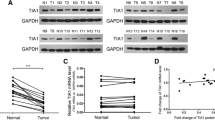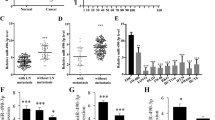Abstract
Background
Colorectal cancer (CRC) is one of the most common types of cancer worldwide. A number of dysregulated microRNAs (miRNAs) have been linked to CRC progression and treatment response and are thought to be promising prognostic biomarkers for this cancer. microRNA-330 (miR-330-5p) has been reported to inhibit cell proliferation through suppressing thymidylate synthase (TYMS). In the current study, miR-330-5p, TYMS, and their interactions were investigated to evaluate their therapeutic and diagnostic value for CRC treatment.
Methods
The expression levels of miR-330-5p and TYMS were evaluated in silico using TCGA datasets for CRC. Data validation was performed on a set of internal samples (100 pairs of CRC tumor specimens and adjacent non-cancerous samples) utilizing real-time PCR assay. The linkage between clinicopathological parameters and expression levels was also investigated.
Results
TCGA results indicated that miR-330-5p and TYMS were significantly upregulated and downregulated in the CRC, respectively. Real-time PCR results confirmed that the expression of miR-330-5p was significantly upregulated in tumor tissues relative to marginal tissues (P = 0.0005), whereas TYMS expression was significantly downregulated (P = 0.0001). The transcript level of miR-330-5p was associated with tumor stage and lymph node metastases.
Conclusion
The microRNA-330 inhibited cell proliferation by suppressing thymidylate synthase (TYMS) in colorectal cancer. Therefore, suggesting that they are valuable factors for further studies of alternative treatment and diagnostic methods.



Similar content being viewed by others
Availability of Data and Material
All data in this article have been sent to the journal.
References
Bray F, et al. Global cancer statistics 2018: GLOBOCAN estimates of incidence and mortality worldwide for 36 cancers in 185 countries. CA Cancer J Clin. 2018;68(6):394–424.
Sideris M, Papagrigoriadis S. Molecular biomarkers and classification models in the evaluation of the prognosis of colorectal cancer. Anticancer Res. 2014;34(5):2061–8.
Arnold M, et al. Global patterns and trends in colorectal cancer incidence and mortality. Gut. 2017;66(4):683–91.
Azar MRMH, et al. Dysregulation of miR-27a and SMAD2 can be a reliable indicator in the prognosis and diagnosis of CRC as well as in response to chemotherapy drugs. Gene Rep. 2020;21:100844.
Siegel RL, Miller KD, Jemal A. Cancer statistics, 2020. CA Cancer J Clin. 2020;70(1):7–30.
Siegel RL, et al. Colorectal cancer statistics, 2020. CA Cancer J Clin. 2020;70(3):145–64.
De Rosa M, et al. Genetics, diagnosis and management of colorectal cancer. Oncol Rep. 2015;34(3):1087–96.
Akbari M, et al. CD133: an emerging prognostic factor and therapeutic target in colorectal cancer. Cell Biol Int. 2020;44(2):368–80.
Newton K, Newman W, Hill J. Review of biomarkers in colorectal cancer. Colorectal Dis. 2012;14(1):3–17.
Asadi M, et al. Transcript level of microRNA processing elements in gastric cancer. J Gastrointest Cancer. 2019;50(4):855–9.
Shirafkan N, et al. MicroRNAs as novel biomarkers for colorectal cancer: new outlooks. Biomed Pharmacother. 2018;97:1319–30.
Ghasabi M, et al. The effect of combined miR-200c replacement and cisplatin on apoptosis induction and inhibition of gastric cancer cell line migration. J Cell Physiol. 2019;234(12):22581–92.
Shomali N, et al. Downregulation of miR-146a promotes cell migration in Helicobacter pylori–negative gastric cancer. J Cell Biochem. 2019;120(6):9495–505.
Ding L, et al. The dual role of microRNAs in colorectal cancer progression. Int J Mol Sci. 2018;19(9):2791.
Sadeghiyeh N, et al. MicroRNA-145 replacement effect on growth and migration inhibition in lung cancer cell line. Biomed Pharmacother. 2019;111:460–7.
Sehati N, et al. MicroRNA-330 inhibits growth and migration of melanoma A375 cells: In vitro study. J Cell Biochem. 2020;121(1):458–67.
Tamjidifar R, et al. Prognostic and diagnostic values of miR-506 and SPON 1 in colorectal cancer with clinicopathological considerations. J Gastrointest Cancer. 2020:1–5.
O’Leary NA, et al. Reference sequence (RefSeq) database at NCBI: current status, taxonomic expansion, and functional annotation. Nucleic Acids Res. 2016;44(D1):D733–45.
Shirjang S, et al. miR-330 regulates colorectal cancer oncogenesis by targeting BACH1. Adv Pharm Bull. 2020;10(3):444–51.
Lee KH, et al. MicroRNA-330 acts as tumor suppressor and induces apoptosis of prostate cancer cells through E2F1-mediated suppression of Akt phosphorylation. Oncogene. 2009;28(38):3360–70.
Qu S, et al. MicroRNA-330 is an oncogenic factor in glioblastoma cells by regulating SH3GL2 gene. PLoS One. 2012;7(9)e46010.
Yoo H-I, Kim B-K, Yoon SK. MicroRNA-330-5p negatively regulates ITGA5 expression in human colorectal cancer. Oncol Rep. 2016;36(5):3023–9.
Xu W, et al. MicroRNA-330 inhibited cell proliferation and enhanced chemosensitivity to 5-fluorouracil in colorectal cancer by directly targeting thymidylate synthase. Oncol Lett. 2017;13(5):3387–94.
Soheilifar MH, et al. BMI1 as a potential target of miR-330–3p in colorectal cancer. Middle East J Rehabil Health Stud. 2018:1–6.
Li Y, et al. miR-330 regulates the proliferation of colorectal cancer cells by targeting Cdc42. Biochem Biophys Res Commun. 2013;431(3):560–5.
Mansoori B, et al. miR-330 suppresses EMT and induces apoptosis by downregulating HMGA2 in human colorectal cancer. J Cell Physiol. 2020;235(2):920–31.
Longley DB, Harkin DP, Johnston PG. 5-fluorouracil: mechanisms of action and clinical strategies. Nat Rev Cancer. 2003;3(5):330–8.
Escalante PI, Quiñones LA, Contreras HR. Epithelial-mesenchymal transition and microRNAs in colorectal cancer chemoresistance to FOLFOX. Pharmaceutics. 2021;13(1):75.
Gallegos-Arreola MP, et al. TYMS 2R3R polymorphism and DPYD [IVS] 14+ 1G> A mutation genes in Mexican colorectal cancer patients. Acta Biochim Pol. 2018;65(2):227–34.
Carreras CW, Santi DV. The catalytic mechanism and structure of thymidylate synthase. Annu Rev Biochem. 1995;64(1):721–62.
Jiang H, et al. Expression of ERCC1 and TYMS in colorectal cancer patients and the predictive value of chemotherapy efficacy. Oncol Lett. 2019;18(2):1157–62.
Popat S, Matakidou A, Houlston RS. Thymidylate synthase expression and prognosis in colorectal cancer: a systematic review and meta-analysis. J Clin Oncol. 2004;22(3):529–36.
Koumarianou A, et al. Prognostic markers in early-stage colorectal cancer: significance of TYMS mRNA expression. Anticancer Res. 2014;34(9):4949–62.
Klingbiel D, et al. Thymidylate synthase (TS) expression as a prognostic molecular marker in stage II/III colon cancer. Proc Am Soc Clin Oncol. 2013.
Amin MB, Edge SB. AJCC cancer staging manual. Springer; 2017.
Guo S, et al. SH3PXD2A-AS1/miR-330–5p/UBA2 ceRNA network mediates the progression of colorectal cancer through regulating the activity of the Wnt/β-catenin signaling pathway. Environ Toxicol. 2020.
Asadi M, et al. Identification of miRNAs correlating with stage and progression of colorectal cancer. Colorectal Cancer. 2019;8(2):CRC06.
Acknowledgements
The authors are thankful to patients and their families for their contribution to the study.
Funding
This study was supported by a grant from the research deputy of the Department of Tuberculosis and Lung Diseases Research Center, University Tabriz University of Medical Sciences, Tabriz, Iran.
Author information
Authors and Affiliations
Contributions
(I). Conception and design: Leila Karimiand Touraj Asvadi Kermani. (II). Administrative support: Milad Jaberi. (III). Provision of study materials or patients: Milad Asadi. (IV). Collection and assembly of data: Habib Zarredar and Venus Zafari. (V). Data analysis and interpretation: Milad Asadi and Soghra Bornehdeli. (VI). Manuscript writing: Leila Karimi. (VII). Final approval of manuscript: all authors.
Corresponding author
Ethics declarations
Ethics Approval and Consent to Participate
This study was confirmed by the Ethical Committee of Tabriz University of Medical Sciences (IR.TBZMED.REC.1399.206) and written informed consent was obtained from all patients.
Consent for Publication
Written informed consent was obtained from all patients.
Conflict of Interest
The authors declare no competing interests.
Additional information
Publisher's Note
Springer Nature remains neutral with regard to jurisdictional claims in published maps and institutional affiliations.
Rights and permissions
About this article
Cite this article
Karimi, L., Jaberi, M., Asadi, M. et al. Significance of microRNA-330-5p/TYMS Expression Axis in the Pathogenesis of Colorectal Tumorigenesis. J Gastrointest Canc 53, 965–970 (2022). https://doi.org/10.1007/s12029-021-00695-x
Accepted:
Published:
Issue Date:
DOI: https://doi.org/10.1007/s12029-021-00695-x




